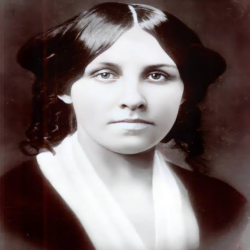
Louisa May Alcott
| Date of Birth | : | 29 Nov, 1832 |
| Date of Death | : | 06 Mar, 1888 |
| Place of Birth | : | Germantown, Philadelphia, Pennsylvania, United States |
| Profession | : | Short Story Writer, Novelist |
| Nationality | : | American |
Louisa May Alcott was an American novelist, short story writer, and poet best known for writing the novel Little Women and its sequels Little Men and Jo's Boys.
Early life
Louisa May Alcott was born on November 29, 1832, in Germantown, which is now part of Philadelphia, Pennsylvania, on her father's 33rd birthday. Her parents were transcendentalist and educator Amos Bronson Alcott and social worker Abigail "Abby" May. She was the second of four daughters: Anna Bronson Alcott was the eldest, while Elizabeth Sewall Alcott and Abigail May Alcott were the two youngest. As a child, she was a tomboy who preferred boys' games. The family moved to Boston in 1834, where Alcott's father established the experimental Temple School and joined the Transcendental Club with Ralph Waldo Emerson and Henry David Thoreau. Bronson Alcott's opinions on education, tough views on child-rearing, and moments of mental instability shaped young Alcott's mind with a desire to achieve perfection, a goal of the transcendentalists. His attitudes towards Alcott's wild and independent behavior and his inability to provide for his family created conflict between Bronson Alcott, his wife, and their daughters. Abigail reportedly resented her husband's inability to recognize her sacrifices and related his thoughtlessness to the larger issue of the inequality of sexes. She passed this recognition and desire to redress wrongs done to women on to Louisa.
Later years
In 1877, Alcott was one of the founders of the Women's Educational and Industrial Union in Boston. After her youngest sister May died in 1879, Louisa assumed the care of her niece, Lulu, who was named after Louisa. Alcott suffered chronic health problems in her later years, including vertigo. She and her earliest biographers attributed her illness and death to mercury poisoning. During her American Civil War service, Alcott contracted typhoid fever and was treated with Calomel, a compound containing mercury. Recent analysis of Alcott's illness suggests that her chronic health problems may have been associated with an autoimmune disease, not mercury exposure. However, mercury is a known trigger for autoimmune diseases as well. An 1870 portrait of Alcott does show her cheeks to be quite flushed, perhaps with the "butterfly rash" across cheeks and nose which is often characteristic of lupus, but there is no conclusive evidence available for a firm diagnosis.
Quotes
I like adventures, and I’m going to find some.
The emerging woman ... will be strong-minded, strong-hearted, strong-souled, and strong-bodied...strength and beauty must go together.
Some people seemed to get all sunshine, and some all shadow.
A faithful friend is a strong defense; And he that hath found him hath found a treasure.
The duty we owe ourselves is greater than that we owe others.
Prove that you understand the worth of time by employing it well.
Preserve your memories, keep them well, what you forget you can never retell.
When Emerson's library was burning at Concord, I went to him as he stood with the firelight on his strong, sweet face, and endeavored to express my sympathy for the loss of his most valued possessions, but he answered cheerily, 'Never mind, Louisa, see what a beautiful blaze they make! We will enjoy that now.' The lesson was one never forgotten and in the varied lessons that have come to me I have learned to look for something beautiful and bright.
The mere possession of a gun is, in itself, an urge to kill, not only by design, but by accident, by madness, by fright, by bravado.
Many argue; not many converse.
